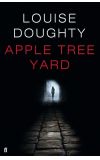
19 Jun 2013 00:37:18
Apple Tree Yard, Louise Doughty's seventh novel, shares with her previous books a preoccupation with the "what if" territory of ordinary life, those unthinkable events that divide a life into "before" and "after". Her last novel, the Costa award-shortlisted Whatever You Love, explored the killing of a child and a mother's desire for revenge. In Apple Tree Yard, she gives us the aftermath of an affair, but what begins as a familiar scenario twists away unexpectedly into a story of violent assault and murder. Doughty examines, in the sober light of hindsight, the chain of individual choices that led to the irreversible act that shatters lives and lands her narrator in the dock.
Dr Yvonne Carmichael is a geneticist so eminent in her field that she is invited to speak at parliamentary select committees, which is where her trouble begins. "DNA made me and DNA undid me," she says at the start of her trial. She describes herself as "a pathologically law-abiding woman". At 52, she has a nice house, a long marriage to Guy, also a scientist, and two children. Though this seemingly ordered life is not as neat as it appears on the surface, it has held together through the storms of her husband's infidelity and her son's mental illness. But it cannot survive the forces unleashed by her attraction to a man who tells her he works as a security consultant at the Palace of Westminster. From the moment she surrenders to the thrill of that desire, her life begins to slip out of her control.
Yvonne narrates her story from the dock, switching from the trial to the events that brought her there. She addresses her story to her lover, whom she has deduced is a spy, mostly through an inner monologue but sometimes through letters, written on her computer in the dead of night but never sent, as if she needs to confirm the truth of what has happened to them both by reminding him of the intimate details. Doughty controls the progress of this narrative beautifully, parsing out information with tantalising hints at what is to come, so that we are almost halfway through the book before we learn whose murder Yvonne is accused of, and why, or even her lover's name. Although the outcome is hinted at in the prologue, the drama of the courtroom is sustained until the verdict, as Doughty deftly weaves Yvonne's story with the version presented in fragments by witnesses and lawyers in the courtroom.
For this is principally a novel about stories. "The stories we tell in order to make sense of ourselves, to ourselves," as Yvonne puts it, and the gap between them and the stories others create about us, based on selective facts. A criminal trial is only the presentation of a series of stories, or the same story, told from different angles. As readers, we are on Yvonne's side, privy to her secret account; we know more about her than the jury knows – more, even, than her own barrister or husband know. It is a mark of Doughty's assured touch with the unfolding of her narrative that we believe Yvonne's version of the truth, not realising that perhaps she has been withholding information from us, too.
Apple Tree Yard is a chilling novel, in part because of the unsparing light it shines on our ability to deceive ourselves. Doughty has a particular gift for unsettling stories, for making us ask difficult questions of ourselves, our own relationships and choices, and this is her strongest book yet. It's not a comfortable read, but it is entirely compelling.

